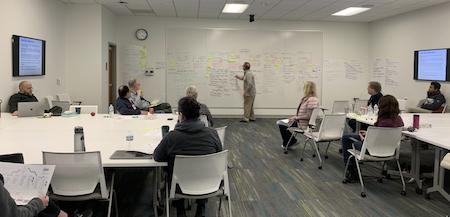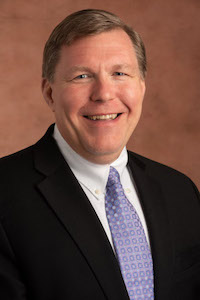
Improvements are coming to the research process at the medical school after an event recently highlighted ways to facilitate improved biostatistics support for research projects.
More than twenty participants identified strengths and weaknesses of the current research process at a Lean event held at the medical school this spring that aimed to set up processes and company culture to support continuous improvement. During the event, participants reviewed day-to-day activities to determine what steps in the process bring value, what steps are necessary but don’t always bring value and what steps are waste. The goal is to eliminate the waste, therefore creating an efficient process for teams to follow.
This was the third Lean-style event hosted by WMed’s Department of Biomedical Informatics, its chair, Philip Kroth, MD, MSc, and Theresa McGoff, the department’s manager of data advancement services. Dr. Kroth and McGoff chose faculty members and staff who have worked on investigator-initiated projects at the medical school. WMed’s biostatistical services transitioned to the Department of Biomedical Informatics in 2022, and the team is working toward an investigator-centric approach to research project development.
They analyzed data from June 2021 to June 2022, finding that out of 100 projects started, 30 percent didn’t make it to Institutional Review Board submission, and overall, 42 percent of projects were never completed.
“We knew that there was some frustration and some angst with using the statistical services at WMed, so we wanted to explore this further and give our faculty and staff that are involved in the process a seat at the table to help us improve what we are doing,” Dr. Kroth said. “We knew we weren't doing things in the most efficient manner.”
At the time, Dr. Kroth’s team would typically have repeated meetings with principal investigators and their teams to determine what data they wanted to analyze, which would prolong the entire timeline.
“A lot of time was going into these projects and it was frustrating for the study teams, it was frustrating for us, and it was really frustrating the students,” McGoff said. “We knew that that was affecting their satisfaction with being a part of research. For example, they would join a research project and the project would fizzle out. We had a couple of projects where they had a full protocol, but the project never made it through the IRB because questions didn’t get answered.”

They asked a cross-section of WMed employees to participate in the Lean event and brought in an outside consultant who is experienced in healthcare process improvement. They took two days to complete several steps -- identifying the information needed by investigators and the research team, mapping out possible delays, identifying opportunities for improvement and creating an ideal process. With the ideal process in place, the group calculated that they could cut projected delay times by more than 400 hours and increase the number of projects that would be complete and accurate.
The group determined appropriate steps to overhauling the process at WMed -- developing a robust communication plan, clarifying roles and expectations, discussing protected time, improving scheduling efficiency of meetings, engaging leadership support, creating a process to prioritize projects, establishing a more robust statistical platform and establishing a standard method for tracking data and projects.
“What I think Lean does really well is you get all the people in the room, everyone gets a chance to speak and everyone feels heard,” Dr. Kroth said. “A lot of people work in different parts of the organization and know things but never get asked how we could do things better. The idea is to draw on the strengths of the whole diverse group, and it’s a really good process for getting people together who have been frustrated with each other.”
The process is good at drawing out ideas from people and then at the end, the people that participate feel that they've been heard, Dr. Kroth said. “If it worked right, participants buy into the solution they helped to create, so they become ambassadors for the project,” he said.
Dr. Kroth and McGoff will spend the next year working through the work plan the group developed, starting with easy-to-implement ideas and working through ideas that will take longer to put into place. They ordered a new server for statistical analysis to replace a seven-year-old server that had been intermittently crashing. They are making improvements to data provenance, or the way of tracking data sets as they undergo changes. They will create a new policy that will require the principal investigator of a project to be present at all planning meetings to reduce miscommunication and wasted effort. They examined what successful investigators do and will work to add those best practices to the process.
“These are the tough decisions that are hard for one person to make, so it’s nice to have the power of a diverse group to come to a consensus.”
Dr. Kroth and McGoff will develop a document from their findings that will explain the steps and share best practices to serve as a guideline for investigators.
Upon reflecting on the event, its participants say it was worthwhile and will bring important improvements to the medical school. Joshua Mastenbrook, MD, program director of the medical school’s EMS fellowship was among a wide variety of participants and that cross section provided feedback from different perspectives, he said. The steps developed from the workshop will cut down on confusion and frustrations from faculty members in the research process.
“Having gone through the process and seeing how it works and the outcomes from it, I think it worthwhile if there were an opportunity to do this again with another department,” Dr. Mastenbrook said. “It was very genuine of them to host the Lean event and it was clear from Dr. Kroth and Theresa that they were invested in improving the process.”
Liz Lorbeer, library director at WMed and a participant of the event, said the group identified ways to streamline the process and identified the current knowledge and service gaps. Having a more organized process will be scalable and will give students and residents the opportunity to complete research even if they are only here for a few years.
In addition, Lorbeer said, this is the first time she has heard the voices of biostatisticians provide input into the process.
“They really had a say in it and I think that’s what makes it so much better,” she said.
